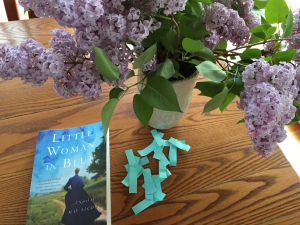Final Chapters
The advanced review copies of Little Woman in Blue have been sent to the stacks reviewers make, and soon may be praised, criticized, or ignored. I’m excited and scared and also just busy, though my first novel for adults won’t be in stores until September. Just because a book is in temporary covers doesn’t mean my work is done. That nest of robin’s egg blue post-its in the photo is from Melodye, who made an eagle-eyed search for errors she marked with my favorite color. I’m grateful for how she pointed out words I might rearrange for greater force, caught the “shorted” that should have been “shortened,” and suggested places to shuffle back proper names where I’d put “she” for more invisibility – until that switches to confusion. While others have netted out commas, she wanted a few more. Commas have come and gone, like bees swarming from a hive and back. Commas seem to be as much art as science. There are rules, but enough exceptions to fill a guidebook, though who would dare to edit that one?
Focusing in again is a reminder of how each small choice matters to the whole. My friend Deb also went over the ARC for typos, missing or errant words, the sort that get left when you change a sentence too many times and miss the tracks you left. Deb is a painter as well as a writer, so I liked having her thoughts on May’s watercolors (i.e. avoid the words “opaque” and use “washes” rather than “lines.”) We can all miss the misspelling or slack sentence when looking at the wider picture, the absent word that the rest of us apparently read in our minds. Any mistake is embarrassing. My name is on the cover of a book, but my skin feels as thin as it did when I also tried to look together if not professional while joining other writers around a long table back in college. Vulnerability never ends.
Only tiny changes are permitted within an advanced reading copy: nothing that will change page numeration. But just because a change is as small as one letter or word doesn’t mean anxiety can’t run rampant. After years of writing, revising, and editing the editing, this is my last chance to make certain things are as I wish. When the book is out, I’ll enjoy the party of its existence, but right now my focus is on dust lurking on a ledge. Am I certain about this or that word? I stare it down the way a beauty might look in a mirror and focus on a flaw no one else in the world would see. A word looks lopsided, or gauzy, or it glares. Or can I let it be?
This has been my time by the lilacs. Now I’ve inserted the changes, made choices, and am calling the book done. Not that there aren’t other tasks for a book coming out this fall. I just updated my website to include notes about my inspiration for Little Woman in Blue, historical background information, an Alcott reading list, and a readers guide to the novel. (Comments welcome!) I’m also spending some time ushering my book toward stores and small museums, where the story of a nineteenth century woman trying to balance art and love might be welcome. I couldn’t have been luckier than to have walked into the Odyssey Bookshop, been greeted by lovely Hannah, who took my review copy from my hands as eagerly as if she’d never noticed the stacks of gorgeous books all around us. She asked if I’d like to do the launch there and we settled on October 7. The wonderful Porter Square Bookstore in Cambridge contacted me to read on October 23. Please come!
Does all this seem far off? Not really. I’ve drafted a talk about May and other nineteenth women artists that I’m offering to libraries with book clubs. And every day I work on a new novel that’s almost ready for my writing group. I write parts of poems, some of which may gather, like metal shavings pulled to a magnet, into one or two real poems. After being brutally nit picky, it’s good to let myself make mistakes, enjoying the forgiving nature of new work. Eventually I get it right, and when I have a book I do the work I file under marketing, though my criteria is that what I propose should be fun even if I sell just one copy. I could skip the stomach-clenching moments watching someone turn over my book to examine the cover, but all in all I like meeting readers and talking about the women whose lives I’ve tried to put on paper.
I’m excited to be attending the Historical Novel Society conference next month, where I’ll enjoy the speakers, which include Karen Cushman and Diana Gabaldon, and in the hallways I’ll try to exercise my limited networking skills. A friend suggested I stand on a table at lunch and shout for all librarians to join me. I expect to be more subtle, but not entirely. There will be workshops on using swords, rapiers, and daggers, dancing with the Darcys. These are my people, and it’s not all about dignity. When I ordered postcards, I also bought a canvas bag printed with the cover of my novel. It will either start conversations or keep people away, and isn’t the winning and losing how most things go? Every day at my desk, I choose words and reject others. In the world, some people will pick up my book and others will step back as if it might sting their fingers.
Publishing a book about a woman who’s haunted me for decades is a dream come true. I’m celebrating, but as with anything wanted and achieved, life doesn’t spin in entirely new directions. I’m taking plenty of sidesteps and steps back, managing embarrassment as well as elation, making lists, mailing, and checking off mundane tasks. I’m walking through doors where my book might be wanted with the spirit of Red Riding Hood swinging her basket, unaware she might find anyone except the friendliest of grandmothers, and if there’s instead someone wolf-ish, I’ll try another door. I’m crafting new stories and remembering why the older ones mattered enough so that I spent years researching, writing, and revising. It’s time to do my best impression of a Buddhist and let the book I created go. I’ve got to smell the last of the lilacs, pet the good dog by my feet, and be thankful for all the people who’ve helped me get to where I am. Every single reader, like you.






